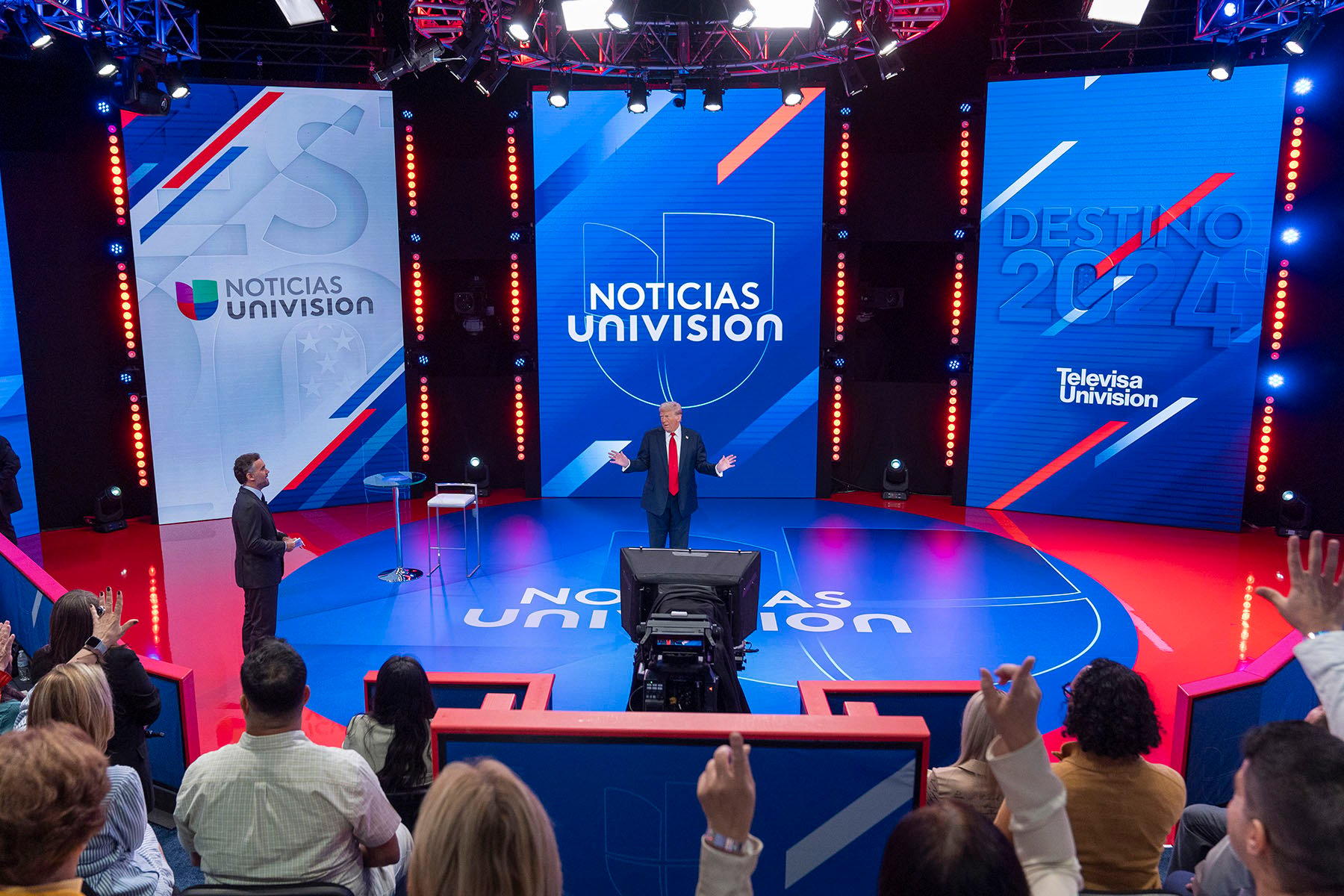Your trusted source for contextualizing Election 2024 news. Sign up for our daily newsletter.
Ivett Castillo identified herself as a voter in Las Vegas whose Mexican-born mother had passed away just weeks earlier. The 40-year-old said her mother had lived and worked in the United States since before Castillo was born and died undocumented at 67.
“She was never ever able to get the type of care and service that she needed or deserved,” Castillo said through tears during last week’s town hall with Vice President Kamala Harris hosted by Univision. “So my question for you is: What are your plans or do you have plans to support that subgroup of immigrants who have been here their whole lives, or most of them, and have to live and die in the shadows?”
At a twin event with former President Donald Trump on Wednesday, a Mexican-born voter from California described working alongside mostly undocumented immigrants harvesting strawberries and broccoli. He asked Trump who would do that job if Trump was successful at deporting millions of undocumented people.
These moments put a fleeting spotlight on the fate of the estimated 11 million undocumented immigrants living in the United States, a complex element of the immigration debate that has been relegated to the background amid an intense focus on border security.
Trump’s plan for these immigrants is to launch the “largest deportation in the history of our country,” using the military to detain and mass-deport undocumented immigrants. It’s not clear who exactly among them would be targeted and how they would be apprehended. Trump blames immigrants living in the United States without authorization for taking jobs away from U.S. citizens, pulling public school resources and housing away from American families and “poisoning the blood of our country,” language linked to Nazi and white supremacist ideologies. During his administration, Trump enacted a number of controversial measures to curb or discourage immigration, including banning travelers from several Muslim countries from entering the United States and separating parents and children who had illegally crossed the border.
Harris has been critical of Trump’s deportation plan as he vies for reelection, but has focused much of her message on toughening up security at the border, a top-of-mind issue for many voters. In a speech before the Congressional Hispanic Caucus, though, she sought a middle ground by saying the government can both “create an earned pathway to citizenship and ensure our border is secure.” Harris has not made clear who would qualify for citizenship or how she would overcome resistance in Congress, where, in the past, similar measures have gone nowhere.
When asked about the citizenship issue in the Univision town hall on Oct. 10, Harris quickly pivoted to her support for bipartisan border security legislation that would not remediate the legal status of undocumented immigrants. When asked more specifically about undocumented immigrants brought to the United States as children — a group known as Dreamers, the majority of whom are women — Harris said she remained committed to creating a path for them.
“That is one of the priorities for me, frankly, in terms of my motivation for what I know we must do,” Harris said.
The fate of undocumented immigrants will have important consequences for millions of families in the United States. A 2023 Pew Research Center analysis of available data found that 5 percent of U.S. households include at least one person who is undocumented. Almost 70 percent of these households are considered “mixed status” — in other words, they are made up of authorized and unauthorized immigrants or U.S.-born citizens. About 4.4 million U.S.-born children under 18 live with an unauthorized immigrant parent.
The country is sharply divided on the fate of undocumented immigrants. A mid-September survey from Scripps News/Ipsos found that about 54 percent of Americans — 86 percent of Republicans, 58 percent of independents and 25 percent of Democrats — said they “strongly” or “somewhat” support a wide-scale effort to deport millions of immigrants. A higher share — 68 percent — said they support creating a pathway to citizenship for undocumented immigrants who arrived in the United States as children.
When asked to rank their priorities on immigration, one-third of voters said they support securing the southern border. Meanwhile, one in five said their top priority was offering a path to citizenship for undocumented immigrants living in the United States, almost the same breakdown among voters who said it is deporting those who are in the country illegally.
A summer survey of likely voters in key battleground states by the left-leaning group The Immigration Hub suggests women voters may be less likely to support mass deportations. When given the option between a pathway to citizenship for immigrants who meet certain requirements or mass deportations, women voters were eight points more likely to choose the former.
During Harris’ town hall, the vice president told Castillo, the grieving Nevada voter, that the nation’s broken immigration system is likely to have kept her mother from accessing the health care she needed. She pointed to President Joe Biden’s 2021 proposal that would have created an eight-year path to citizenship for most of the 11 million undocumented immigrants in the country, blaming Republicans for its failure. She didn’t say whether she would pursue similar policy.
Harris quickly moved on to criticizing Trump and Republicans in Congress for tanking a border security bill earlier this year, which she said was “one of the strongest border security bills we’ve had in decades, and it included 1,500 more border agents to go to the border.” The bill would have created a pathway to citizenship only for certain Afghan immigrants. The bill, which was negotiated by top Republicans in the Senate, failed after Trump urged congressional Republicans to reject the measure.
Harris didn’t say specifically how she plans to address the legal status of immigrants like Castillo’s mother.
Harris did not mention this in the town hall, but she has also championed a Biden administration policy to create a pathway to citizenship for the undocumented spouses of American citizens. That program remains tied up in court.

Meanwhile, during Trump’s Univision appearance, Jorge Velázquez, 64, a farmworker in Santa Maria, California, said he has long worked in the fields, “hunched over, with my hands,” harvesting broccoli and strawberries. “This tough job is mainly done by undocumented people,” he said. “If you deport these people, who would do that job and what price would we pay for food?”
Trump started off by saying that he was “the best thing that happened to farmers,” and then went on to blame the Biden administration for the influx of immigrants at the southern border. Then, Trump went on to suggest that these jobs could be filled by American workers, despite an ongoing farm labor crisis and evidence that Americans are not interested in doing farmwork.
“A lot of the jobs that you have and that other people have are being taken by these people that are coming in. And the African American population, the Hispanic population in particular, are losing jobs now because millions of people are coming in,” Trump said, before repeating an unfounded claim that “tremendous numbers” of incoming immigrants are the product of foreign governments emptying out mental institutions.
Trump said he was open to foreign workers, but not those who are undocumented currently in the United States. “We want workers… but they have to come in legally.”
To check your voter registration status or to get more information about registering to vote, text 19thnews to 26797.





